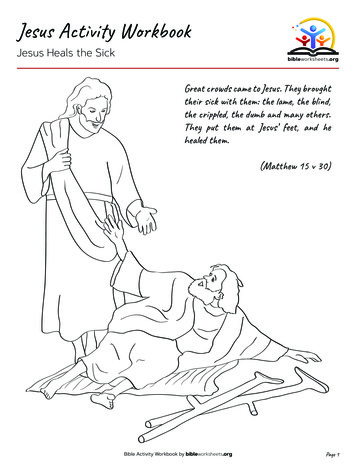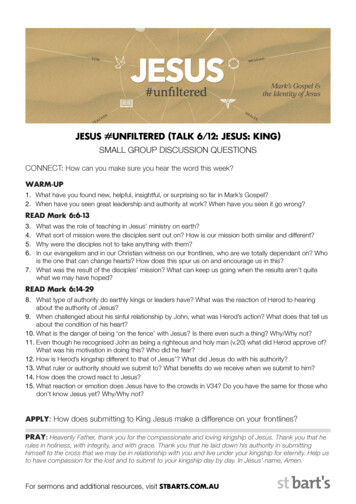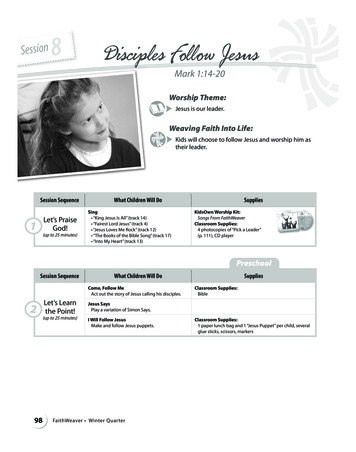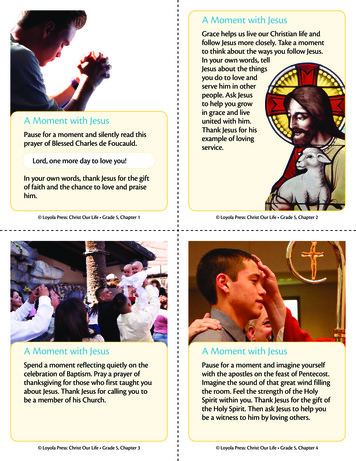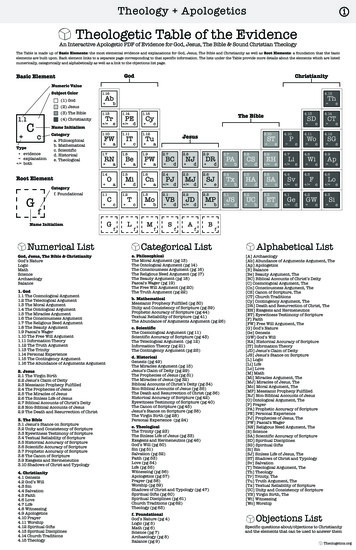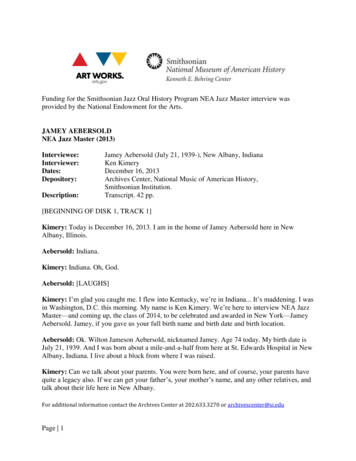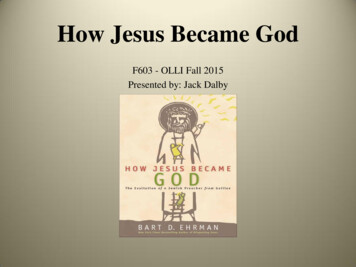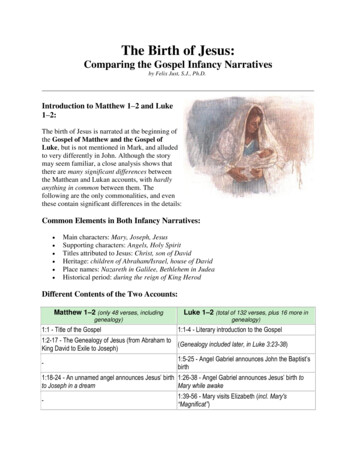
Transcription
The Birth of Jesus:Comparing the Gospel Infancy Narrativesby Felix Just, S.J., Ph.D.Introduction to Matthew 1–2 and Luke1–2:The birth of Jesus is narrated at the beginning ofthe Gospel of Matthew and the Gospel ofLuke, but is not mentioned in Mark, and alludedto very differently in John. Although the storymay seem familiar, a close analysis shows thatthere are many significant differences betweenthe Matthean and Lukan accounts, with hardlyanything in common between them. Thefollowing are the only commonalities, and eventhese contain significant differences in the details:Common Elements in Both Infancy Narratives: Main characters: Mary, Joseph, JesusSupporting characters: Angels, Holy SpiritTitles attributed to Jesus: Christ, son of DavidHeritage: children of Abraham/Israel, house of DavidPlace names: Nazareth in Galilee, Bethlehem in JudeaHistorical period: during the reign of King HerodDifferent Contents of the Two Accounts:Matthew 1–2 (only 48 verses, includingLuke 1–2 (total of 132 verses, plus 16 more ingenealogy)genealogy)1:1 - Title of the Gospel1:1-4 - Literary introduction to the Gospel1:2-17 - The Genealogy of Jesus (from Abraham to(Genealogy included later, in Luke 3:23-38)King David to Exile to Joseph)-1:5-25 - Angel Gabriel announces John the Baptist’sbirth1:18-24 - An unnamed angel announces Jesus’ birth 1:26-38 - Angel Gabriel announces Jesus’ birth toto Joseph in a dreamMary while awake-1:39-56 - Mary visits Elizabeth (incl. Mary's“Magnificat”)
-1:57-58 - Elizabeth gives birth to her son (John theBaptist)-1:59-80 - John the Baptist is circumcised & named(incl. Zechariah's “Benedictus”)-2:1-5 - Joseph & Mary journey to Bethlehem for thecensus1:25 & 2:1a - Mary’s son is born in Bethlehem ofJudea, and named Jesus2:6-7 - Mary gives birth to her son in Bethlehem ofJudea-2:8-14 - Angels appear to some shepherds (incl. the"Gloria" of the angels)-2:15-20 - Shepherds visit Mary & Joseph & the infantlying in a manger-2:21 - The infant is circumcised & named Jesus-2:22-38 - Jesus is presented to God in the Temple(incl. Simeon's "Nunc Dimittis")2:1b-12 - Magi from the East come; they first visitHerod, then Jesus-2:13-21 - Joseph & Mary flee to Egypt with the childJesus;the Innocents are murdered; the Holy Family returnsto Israel2:22-23 - They journey to Nazareth-2:39-40 - The family returns to Nazareth2:41-52 - At age twelve, Jesus & his parents visit theJerusalem TempleClick here for more detail on the structure of Luke's Infancy NarrativeDifferent Theological Emphases of Each Narrative:.Matthew 1–2Luke 1–2DrivingForce:Hebrew Scriptures are fulfilled (1:22-23; 2:5- Holy Spirit is at work (1:1, 35, 41, 67; 2:25-27)Jesus'Heritage:* Son of David, son of Abraham (1:1-17)* Legal son of Joseph, but child of theHoly Spirit (1:18-25)* Son of God, son of Mary by the Holy Spirit* Messiah (1:1, 16-18; 2:4)* Jesus: "For he will save his people fromtheir sins" (1:21, 25)* Emmanuel: "God with us" (1:23)* King of the Jews (2:2)* "A ruler who is to shepherd my people* Jesus (1:31; 2:21)* Son of the Most High; Son of God (1:32, 35)* He will be great, holy, full of wisdom and graceNames& Titles:6, 15, 17-18, 23)(1:26-38)* Heir to David's throne, over the house of Judah(1:32-33; 2:4)(1:32, 35; 2:40)* "Of his kingdom there will be no end" (1:33)* A Savior is born. who is Messiah and Lord(2:11, 26)
Israel" (2:6)* Nazorean (2:23)* A light for revelation to Gentiles and for glory toIsrael (2:32)Characters Men: King David, Joseph of Nazareth,Emphasized: Magi from the East,King Herod, chief priests & scribes,Ethnarch ArchelausWomen: Virgin Mary of Nazareth, Elizabeth,AnnaPoor & Aged: Shepherds, Zechariah, SimeonThemes:glory, praise, joy; poverty, humility, faithobstacles, conflict, fear, murder, politicsOT Parallels: Dreamer Joseph (Genesis 37–41)Baby Moses (Exodus 1–2)Birth of Samson (Judges 13)Birth of Samuel (1 Sam 1–2)Number[King] David 14 (DVD 4 6 4);Symbolism:three groups of 14 generations ingenealogy; focus on royalty70 weeks from Gabriel's first Annunciation toPresentation in Temple?related to 70-week prophecy by angel Gabriel inDaniel 9:24-27?DistinctiveImages:Old Testament Quotations and Allusions in Matthew's Infancy Narrative:Matthew's GospelOld Testament TextsMatt 1:3b-6a - [direct quotation of ten generations from Perez Ruth 4:18-22 - [ten generations from Perez to David]to David]Matt 1:22-23 - All this took place to fulfill what had beenspoken by the Lord through the prophet:"Look, the virgin shall conceive and bear a son, and they shallname him Emmanuel," which means, "God is with us."Isaiah 7:14 - "Therefore the Lord himself will give you a sign.Look, the young woman is with child and shall bear a son, andshall name him Immanuel."Isaiah 8:8b, 10 - "It [the Assyrian army ] will sweep on intoJudah as a flood, and, pouring over, it will reach up to theneck; and its outspread wings will fill the breadth of your land,O Immanuel. / Take counsel together, but it shall be broughtto naught; speak a word, but it will not stand, for God is withus."Matt 2:2 - [Magi ask Herod]: "Where is the child who has been Numbers 24:17-19 - "I see him, but not now; I behold him, butborn king of the Jews? For we observed his star at its rising, not near-- a star shall come out of Jacob, and a scepter shalland have come to pay him homage." (cf. 2:8)rise out of Israel; it shall crush the borderlands of Moab, and
the territory of all the Shethites. / Edom will become apossession, Seir a possession of its enemies, while Israeldoes valiantly. / One out of Jacob shall rule, and destroy thesurvivors of Ir."Matt 2:5-6 - [scribes tell King Herod where the Messiah will beborn]: "In Bethlehem of Judea; for so it has been written bythe prophet: / 'And you, Bethlehem, in the land of Judah, areby no means least among the rulers of Judah; for from youshall come a ruler who is to shepherd my people Israel.'"Micah 5:2 - "But you, O Bethlehem of Ephrathah, who areone of the little clans of Judah, from you shall come forth forme one who is to rule in Israel, whose origin is from of old,from ancient days."Matt 2:11b - Then, opening their treasure chests, they offered Isaiah 60:3, 6 - "Nations shall come to your light, and kings tohim gifts of gold, frankincense, and myrrh.the brightness of your dawn. A multitude of camels shallcover you, the young camels of Midian and Ephah; all thosefrom Sheba shall come. They shall bring gold andfrankincense, and shall proclaim the praise of the LORD."Matt 2:14-15 - Then Joseph got up, took the child and hisHosea 11:1 - "When Israel was a child, I loved him, and out ofmother by night, and went to Egypt, / and remained there until Egypt I called my son."the death of Herod. This was to fulfill what had been spokenby the Lord through the prophet, "Out of Egypt I have calledmy son."Matt 2:17-18 - Then was fulfilled what had been spokenthrough the prophet Jeremiah: / "A voice was heard in Ramah,wailing and loud lamentation, Rachel weeping for her children;she refused to be consoled, because they are no more."Jeremiah 31:15 - "Thus says the LORD: A voice is heard inRamah, lamentation and bitter weeping. Rachel is weeping forher children; she refuses to be comforted for her children,because they are no more."Matt 2:23 - There [in Galilee] he [Joseph] made his home in a Isaiah 11:1 - "A shoot shall come out from the stump oftown called Nazareth, so that what had been spoken through Jesse, and a branch (nezer) shall grow out of his roots."the prophets might be fulfilled, "He will be called a Nazorean."What does Mark's Gospel Say about Jesus' Heritage?The Gospel according to Mark does not contain a narrative of Jesus' birth, but it does make afew brief references to his family heritage: Mark's Gospel does not directly tell us where Jesus was born, and it never mentions thetown Bethlehem;o Several times it calls him "Jesus of Nazareth" (1:24; 10:47; 16:6) or "theNazarene" (14:67).oThese references do not necessarily imply that Jesus was born there, but at least indicate that hegrew up in the town of Nazareth in Galilee (cf. 1:9). Mark's Gospel says nothing about who Jesus' earthly father was, nor does it ever mentionJoseph by name; Only once does Mark's Gospel mention the name of Jesus' mother, calling him "the sonof Mary" (6:3).o His mother is referred to in only one other pericope, when she (along with his"brothers and sisters") comes to see Jesus while he is preaching in Capernaum(3:31-35).ooIn contrast, Jesus several times refers to God as his "Father" (8:38; 14:36; see also 11:25; 13:32).Although Mark tells us that Jesus had "brothers and sisters" (3:31-32), and even names four ofhis "brothers" (6:3; James, Joses, Judas, and Simon), it never specifies if these were older oryounger siblings, nor whether these were children of his own mother and/or father, or other close
orelatives (using "brother/sister" in an extended sense for what we might call "cousins," as wascommon in ancient Jewish culture).At the crucifixion and burial of Jesus, Mark's Gospel mentions the presence of a certain "Mary themother of James the younger and of Joses" (15:40; cfr. 15:47; 16:1); some scholars argue thatthese references are to Mary, the mother of Jesus, while other scholars believe it refers to anotherMary (since these were all very common names at the time).o See also a separate page about The Family of Jesus.Mark mentions Jesus' occupation only once, calling him a "carpenter" (6:3; the Greekword could also mean "craftsman" or "construction worker").oIn contrast, Matthew's Gospel only calls Jesus "the carpenter's son" (Matt 13:55), while Luke andJohn say nothing about what occupation Jesus had before beginning his public ministry.Johannine References to Jesus' Heritage and Birth:Although the Fourth Gospel does not contain a narrative of Jesus' birth, it does mention his"coming into the world" and "becoming flesh" (Latin: incarnatus est), as well as several debatesabout his heritage (Is he Judean or Galilean? human or divine?): The Incarnation: "The Word Made Flesh"o The Ancestry of Jesus: Son of Joseph or Son of God?o "The true light, which enlightens everyone, was coming into the world.He was in the world, and the world came into being through him; yet the world did not know him.He came to what was his own, and his own people did not accept him.But to all who received him, who believed in his name, he gave power to become children of God,who were born, not of blood or of the will of the flesh or of the will of man, but of God.And the Word became flesh and lived among us, and we have seen his glory, the glory as of afather's only son, full of grace and truth." (1:9-14)Philip found Nathanael and said to him, "We have found him about whom Moses in the law andalso the prophets wrote, Jesus son of Joseph from Nazareth."Nathanael said to him, "Can anything good come out of Nazareth?" Philip said to him, "Come andsee."When Jesus saw Nathanael coming toward him, he said of him, "Here is truly an Israelite in whomthere is no deceit!"Nathanael asked him, "Where did you get to know me?" Jesus answered, "I saw you under the figtree before Philip called you."Nathanael replied, "Rabbi, you are the Son of God! You are the King of Israel!" (1:45-49; cf.6:42)The Messiah's Origin: Known or Unknown? From Bethlehem or Galilee?ooNow some of the people of Jerusalem were saying, "Is not this the man whom they are trying tokill?And here he is, speaking openly, but they say nothing to him! Can it be that the authorities reallyknow that this is the Messiah?Yet we know where this man is from; but when the Messiah comes, no one will know where he isfrom."Then Jesus cried out as he was teaching in the temple, "You know me, and you know where I amfrom.I have not come on my own. But the one who sent me is true, and you do not know him. I knowhim, because I am from him, and he sent me." (7:25-29)When they heard these words, some in the crowd said, "This is really the prophet."Others said, "This is the Messiah." But some asked, "Surely the Messiah does not come fromGalilee, does he?Has not the scripture said that the Messiah is descended from David and comes from Bethlehem,the village where David lived?" (7:40-42; cf. 7:52)
ooo"Even if I testify on my own behalf, my testimony is valid because I know where I have come fromand where I am going, but you do not know where I come from or where I am going." (8:14)[Pharisees]: " We know that God has spoken to Moses, but as for this man [Jesus], we do not knowwhere he comes from."The [formerly-blind] man answered, "Here is an astonishing thing! You do not know where hecomes from, and yet he opened my eyes." (9:29-30)[Jewish authorities to Pilate]: "We have a law, and according to that law he ought to die becausehe has claimed to be the Son of God."Now when Pilate heard this, he was more afraid than ever.He entered his headquarters again and asked Jesus, "Where are you from?" But Jesus gave him noanswer. (19:7-9)Use of the Infancy Narratives in the Lectionary for Mass: Fourth Sunday of Advent, Years A, B, C: parts of Matthew 1 & Luke 1Weekdays of Advent, Dec. 17-24: most of Matthew 1 & Luke 1Christmas Eve, Christmas Day, and Christmas Season: Matthew 1–2 & Luke 2 & John1Non-Biblical Elements in Popular Conceptions of Christmas: Combining Details from Matthew & Luke (such as depicting both the Matthean wisemen and the Lukan shepherds and angels, as in the card below, and many other Christmascards, pageants, movies, etc.)The "Three Kings": Caspar, Melchior, Balthazarooo The NT mentions "magi from the East," but does not give their names, nor say that they werekings, nor say there were exactly three of them (read Matt 2:1-12 carefully).Matthew mentions "gifts of gold, frankincense, and myrrh," which eventually led to theassumption that these three costly treasures must have been brought, one each, by three rich andpowerful men.The traditional names are first mentioned in manuscripts and mosaics of the 6th or early 7thcenturies.The Ox & Ass in a Stable (from St. Francis of Assisi; 1181-1226)The Story of the Other Wise Man (by Henry Van Dyke, 1852-1933; full text online;movie version: The Fourth Wise Man, 1985)The Little Drummer Boy (by Katherine K. Davis, Henry Onorati, and Harry Simeone,1958; online lyrics; movie version, 1968)
All images borrowed from ns for Reflection and Discussion:1. What is the main message of the Infancy Narrative in Matthew's Gospel? What isMatthew emphasizing through the way he has told the story?2. What is the main message of the Infancy Narrative in Luke's Gospel? What is Lukeemphasizing through the way he has told the story?3. Why is the birth of Jesus not narrated in Mark's Gospel? What does Mark say aboutJesus' family and heritage?4. How is the "incarnation" of Jesus told very distinctively in John's Gospel? (see esp. John1:14-18)5. Look at some Christmas cards: Are the details of their depictions based on Matthew, orLuke, or both, or neither?See also my collection ofResources for Prayer and Liturgy during Advent and Christmasor more detailed analysis ofThe Infancy Narratives in Luke's GospelReturn to the HOME PAGE of Felix Just, S.J.
This page was last updated on December 28, 2012Copyright 2006--2012
The Birth of Jesus: Comparing the Gospel Infancy Narratives by Felix Just, S.J., Ph.D. Introduction to Matthew 1–2 and Luke 1–2: The birth of Jesus is narrated at the beginning of the Gospel of Matthew and the Gospel of Luke, but is not mentioned in Mark, an

